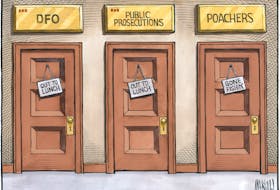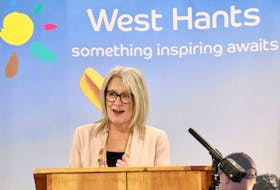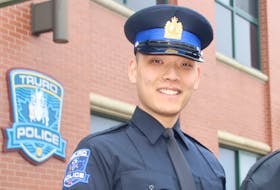WALLACE RIVER, N.S. – Tony Bidwell is a learned man, a retired biology professor with an illustrious career that any academic would envy.At 88, he and his wife Shirley now want to tutor others, and expand their understanding of Alzheimer's disease.
"After Tony was diagnosed we told our closest friends and the word spread quickly," says Shirley. "They were surprised. I think often the expectation is that as soon as people are diagnosed they have one foot in the grave."
And that's far from reality for the Wallace River couple, something they want to convey to others.
Shirley noticed small signs of forgetfulness in her husband early on. He had trouble fixing simple problems; he became confused with banking. The diagnosis of Alzheimer's came in 2011.
"I have it but I don't suffer from it," Tony says. "It's mostly my short-term memory that's affected. One develops techniques for getting around it. I write notes about where I put things and I carry a notebook in my pocket."
It's a nuisance at times, he admits. He can put a book down, then doesn't have the foggiest idea where it is.
"The memory is like a filing cabinet. You can't remember which drawer or cabinet the memories are in. You know they're there but you can't find them."
He's writing his autobiography for family to read, using photos and old journals to help rekindle memories. There are understandably many: climbing the Alps; cycling through France; lecturing in New Zealand and Australia.
Tony and Shirley were among the first to visit China when barriers came down. They had to wear something to identify them as Canadians, he recalls, so they wouldn't be mistaken for Americans, who were not as welcome.
Tony still tries to walk every day. For his safety - and Shirley's peace of mind - he wears a wrist radio transmitter in case he gets lost. So far, his compass is all he's needed.
And far from withdrawing due to Alzheimer's, there's lots to keep Tony active.
He sometimes plays the organ at church; the fact that he lost two fingers during a mountain climbing incident years ago is no hindrance. He makes sweet apple cider from the fruit grown right on their Wallace River property, where they moved in the 1970s.
Tony wrote a couple of biology textbooks, which were translated into several languages. These provided him with an income following retirement.
With Alzheimer's, the stress often takes a toll with the partner. Shirley finds a support group helpful and is grateful to have daughters living nearby.
"One woman at the support group said after her husband was diagnosed, their friends stopped coming to visit," she said. "That is very hard because they need social contact."
The road to greater understanding in others is one Tony has patience for. When he tells people he has Alzheimer's, his goal is for them to see him for what he is: someone with interesting things to say, someone with a life to live.
Making moments matter
Work continues to educate the public about Alzheimer's disease.
There are more than 17,000 Nova Scotians living with Alzheimer's or other dementia and many are very active in their communities.
"A person with Alzheimer's still has so much to give," said Dianne Ardern, who handles education and outreach for the Alzheimer's Society of Nova Scotia in Colchester and Cumberland Counties. "We really want people to see the person, not the disease.
"Sometimes people stop visiting or asking people to go out with them because someone has Alzheimer's but people still need to socialize. Music is powerful so put on music they like - sing with them."
She stresses knowledge is power and if people know enough about Alzheimer's and dementia, it can be spotted earlier. There are many types of dementia and a person can have more than one.
"We all need purpose so if family members can help think of meaningful things for a person to do, that's a big help," said Ardern. "Don't argue with someone who has Alzheimer's, because they're in the moment and it's their reality. My bottom line is make moments matter."
Ardern is available to speak to groups in Colchester County and Cumberland County at no charge. She can be contacted by e-mailing [email protected] or calling 902-694-7775.








